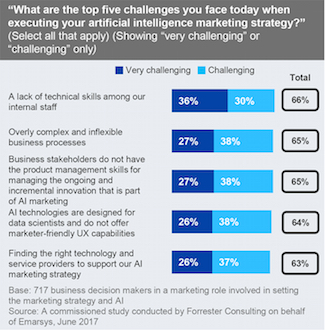Retail marketers are willing to embrace artificial intelligence technologies, but a lack of technical skill required to utilize that technology could be preventing its mainstream adoption, according to a new study of the retail and e-commerce industries commissioned by Vienna, Austria-based cloud marketing software provider Emarsys.
The new study, which sought to understand whether automated marketing is primed for today’s retail and e-commerce sectors, found that a clear majority of marketers and business decision-makers embrace automated technology, with 88 percent claiming AI marketing is poised to reinvent the retail industry and 81 percent believing AI marketing will reinvent what their company does in some capacity.
Most respondents expect that AI will change how marketers work as a whole (82 percent), and many believe that automated marketing will make their marketing teams more efficient and effective (86 percent), and that its use will shift marketing’s role toward more strategic work (79 percent) or enable them to focus on various value-generating tasks as AI automates workflows (82 percent).
 |
However, the study also found that 70 percent of business stakeholders believe their marketing teams don’t necessarily understand AI marketing and currently lack the technical skills to properly leverage this technology in their communications toolkit. 66 percent additionally found the prospect of executing an artificial intelligence strategy to be overly complex and inflexible, and 65 percent expressed not having the product management skills required for keeping up with the critical innovation that’s needed in AI marketing.
Take together, the study suggests that while artificial intelligence is seen as a highly-regarded marketing tool, a number of significant barriers exist in making the adoption of this technology a reality.
A similar report commissioned last year by Weber Shandwick found that a majority of CMOs are willing to embrace AI technology, with most planning or already doing business that accommodates the technology, but 40 percent nonetheless said that AI would require staff with a vastly different skill set than what most companies currently offer.
According to the Emarsys study, another clear majority of retail and e-commerce firms polled — three out of five — said they plan to implement AI marketing technologies within the next year, and 78 percent said they plan to spend at least five percent more on AI marketing technologies within that time frame compared to years past.
However, relatively few retail organizations (11 percent) fall under the category of AI “experts,” according to the study, strategically and organizationally prepared to leverage the technology. A majority — 63 percent — said it will take more than three years to fully leverage AI marketing.
AI’s ability to drive revenue and better serve customers were listed as the top reasons for integrate AI into their marketing wheelhouse. Retailers listed AI’s ability to provide enhanced advanced analytics and intelligent recommendations as the top motivators.
Emarsys’ “Building Trust and Confidence: AI Marketing Readiness In Retail And eCommerce” study was conducted in April by market research company Forrester Consulting. It surveyed respondents specializing in digital marketing, eCommerce, marketing/advertising, leadership and marketing operations at more than 700 businesses with revenues of least $50 million stationed throughout the US, UK, Germany, France and Australia.


 Abandon traditional content plans focused on a linear buyer progression and instead embrace a consumer journey where no matter which direction they travel, they get what they need, stressed marketing pro Ashley Faus during O'Dwyer's webinar Apr. 2.
Abandon traditional content plans focused on a linear buyer progression and instead embrace a consumer journey where no matter which direction they travel, they get what they need, stressed marketing pro Ashley Faus during O'Dwyer's webinar Apr. 2. Freelance marketers and the companies that hire them are both satisfied with the current work arrangements they have and anticipate the volume of freelance opportunities to increase in the future, according to new data on the growing freelance marketing economy.
Freelance marketers and the companies that hire them are both satisfied with the current work arrangements they have and anticipate the volume of freelance opportunities to increase in the future, according to new data on the growing freelance marketing economy. Home Depot's new attempt to occupy two market positions at once will require careful positioning strategy and execution to make it work.
Home Depot's new attempt to occupy two market positions at once will require careful positioning strategy and execution to make it work. Verizon snags Peloton Interactive chief marketing officer Leslie Berland as its new CMO, effective Jan. 9. Berland succeeds Diego Scotti, who left Verizon earlier this year.
Verizon snags Peloton Interactive chief marketing officer Leslie Berland as its new CMO, effective Jan. 9. Berland succeeds Diego Scotti, who left Verizon earlier this year.  Norm de Greve, who has been CMO at CVS Health since 2015, is taking the top marketing job at General Motors, effective July 31.
Norm de Greve, who has been CMO at CVS Health since 2015, is taking the top marketing job at General Motors, effective July 31.


 Have a comment? Send it to
Have a comment? Send it to 
No comments have been submitted for this story yet.